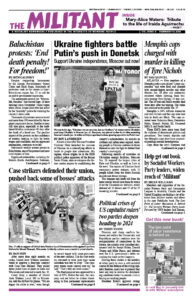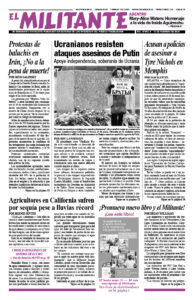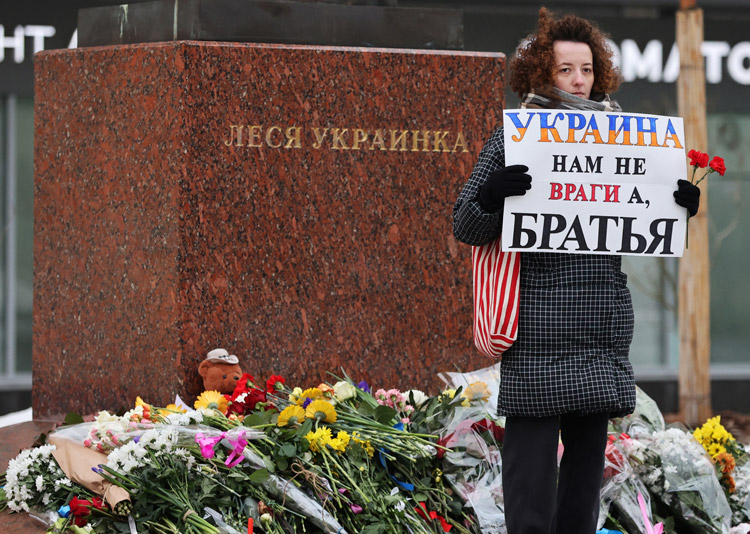Almost a year after Russian President Vladimir Putin launched his invasion of Ukraine, he is intensifying efforts to bomb its people into submission. His regime, whose origins lie in the KGB political police apparatus of the former Soviet Union, aims to reimpose the former czarist empire by annihilating the country’s independence. As assaults on civilians and urban areas expand, working people in Ukraine continue to throw themselves into the fight to defend their country’s sovereignty.
Following months of airstrikes on Ukrainian energy facilities, Moscow Jan. 26 targeted the largest cities of Kyiv and Kharkiv, as well as Lviv in the west. Ten regions of Ukraine faced emergency power outages, with 12 people killed from the latest Russian missile and drone barrage.
The damage and death toll from the latest attacks would have been far worse if not for Ukrainian air defenses, which downed all 24 drones and 47 of the 55 incoming missiles.
Because Moscow never achieved air superiority, its warplanes haven’t been able to obliterate the main Ukrainian cities. But its missile strikes invite comparison with the methods used by the imperialist powers during World War II, when Washington and London firebombed the German cities of Hamburg and Dresden while U.S. bombers did the same to Tokyo. The aim was to kill the largest number of civilians possible and inflict the widest destruction.
For months Moscow’s assaults on the town of Bakhmut in eastern Ukraine have been carried out without any regard for the lives of Russian conscripts. While the Kremlin’s exact losses are a state secret, the boom in Russia’s funeral industry and the backlog of work at crematoriums is one indication of the extent of the carnage. The Bakinskaya cemetery, in southwestern Russia, has been expanded sevenfold in the past two months.
Putin is banking on the larger size of Russia’s population and its military forces to ensure his victory. But the rising death toll is undermining support for the war.
Lenin on Ukraine national rights
The right of oppressed nations to self-determination was championed by V.I. Lenin and the Bolshevik Party as they led the working class and its allies to take power into their own hands in Russia in 1917. The new workers and peasants republic acted on the Bolsheviks’ program.
“For centuries the indignation and distrust of the non-sovereign and dependent nations towards the dominant and oppressor nations have been accumulating,” wrote Lenin in 1919. “Only the Ukrainian workers and peasants themselves can and will decide at their All-Ukraine Congress of Soviets whether the Ukraine shall amalgamate with Russia, or whether she shall remain a separate and independent republic.”
In 1922, after defeating the counterrevolutionary armies of the capitalists, landlords and 16 invading foreign powers, a voluntary federation of the Russian, Ukrainian, and four other republics was established: the Union of Soviet Socialist Republics.
It was only through a bloody counterrevolution led by Joseph Stalin after Lenin’s death that those conquests were reversed and the Ukrainian and other oppressed peoples were denied their language, cultural and other national rights. Ukraine became independent again in 1991 after the collapse of the Stalinist regime.
“The sooner Moscow’s invading army gets out of Ukraine, all of Ukraine, the better for the working class, not only there but in Russia itself and throughout the world,” Alyson Kennedy, Socialist Workers Party candidate for mayor of Fort Worth, Texas, told the Militant Jan. 30.
Since the Kremlin’s missile strike on a Dnipro apartment block that killed 46 residents, including several children, Jan. 14, people in at least 50 Russian cities have been laying flowers and children’s soft toys daily at monuments. In St. Petersburg there are at least seven makeshift memorials. Items removed by police or street cleaners are constantly replenished.
“In the silent war between utility workers and those who sympathize with Ukraine, the latter are winning,” reported the Mozhem Obyasnit news channel Jan. 30.
Around the country individuals continue to hold single-person protests against the war despite facing repeated arrests. Olga Tsukanova, leader of the Council of Soldiers’ Mothers and Wives, was detained at Samara airport for three hours Jan. 22, to prevent her from flying to Moscow where she was going to deliver 700 statements by mothers of conscripts, prisoners and missing persons — complaining about the treatment of their sons — to the prosecutor general’s office. The council was formed after Putin’s call-up of conscripts last September. It says it now has chapters in 89 cities.
Writers, poets and publishers are also finding ways to express their opposition to the war.
“I thought that I was a Russian but this maniac appears to also think he is,” wrote German Lukomnikov, referring to Putin, in a poem published in the January issue of Volga, the Samara literary journal.
The website Briefly, which provides the main Russian-language summary of books for thousands of school and university students, ends each page with a heart in blue and yellow, the Ukrainian national colors. This is followed by a message, “He who defends his own home is right.”


